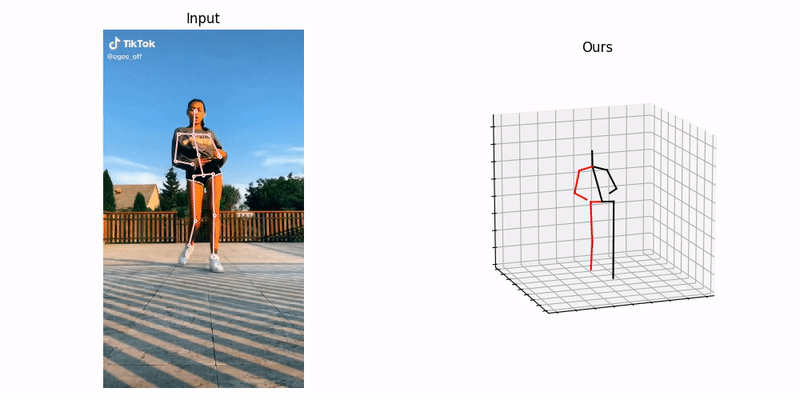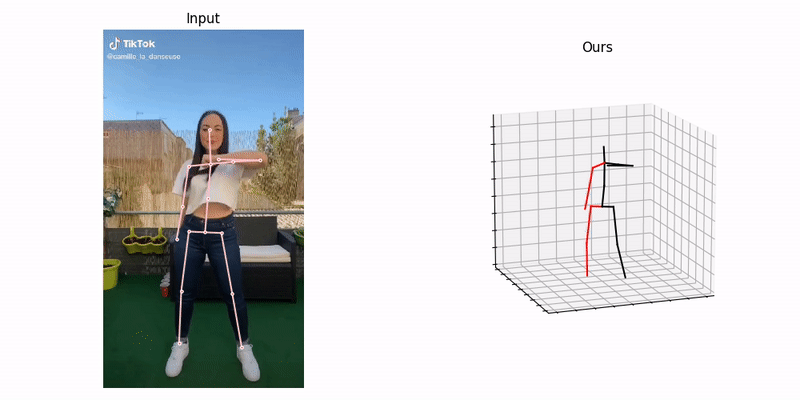PoseAug
PoseAug: A Differentiable Pose Augmentation Framework for 3D Human Pose Estimation
Code repository for the paper:
PoseAug: A Differentiable Pose Augmentation Framework for 3D Human Pose Estimation
Kehong Gong*, Jianfeng Zhang*, Jiashi Feng
CVPR 2021 (oral presentation)



Installation
The experiments are conducted on Ubuntu 16.04, with Python version 3.6.9, and PyTorch version 1.0.1.post2.
To setup the environment:
cd PoseAug
conda create -n poseaug python=3.6.9
conda activate poseaug
pip install -r requirements.txt
Prepare dataset
- Please refer to
DATASETS.mdfor the preparation of the dataset files.
Run training code
- There are 32 experiments in total (16 for baseline training, 16 for PoseAug training),
including four pose estimators (SemGCN, SimpleBaseline, ST-GCN, VideoPose)
and four 2D pose settings (Ground Truth, CPN, DET, HR-Net). - The training procedure contains two steps: pretrain the baseline models and then train these baseline models with PoseAug.
To pretrain the baseline model,
# gcn
python3 run_baseline.py --note pretrain --dropout 0 --lr 2e-2 --epochs 100 --posenet_name 'gcn' --checkpoint './checkpoint/pretrain_baseline' --keypoints gt
python3 run_baseline.py --note pretrain --dropout 0 --lr 2e-2 --epochs 100 --posenet_name 'gcn' --checkpoint './checkpoint/pretrain_baseline' --keypoints cpn_ft_h36m_dbb
python3 run_baseline.py --note pretrain --dropout 0 --lr 2e-2 --epochs 100 --posenet_name 'gcn' --checkpoint './checkpoint/pretrain_baseline' --keypoints detectron_ft_h36m
python3 run_baseline.py --note pretrain --dropout 0 --lr 2e-2 --epochs 100 --posenet_name 'gcn' --checkpoint './checkpoint/pretrain_baseline' --keypoints hr
# videopose
python3 run_baseline.py --note pretrain --lr 1e-3 --posenet_name 'videopose' --checkpoint './checkpoint/pretrain_baseline' --keypoints gt
python3 run_baseline.py --note pretrain --lr 1e-3 --posenet_name 'videopose' --checkpoint './checkpoint/pretrain_baseline' --keypoints cpn_ft_h36m_dbb
python3 run_baseline.py --note pretrain --lr 1e-3 --posenet_name 'videopose' --checkpoint './checkpoint/pretrain_baseline' --keypoints detectron_ft_h36m
python3 run_baseline.py --note pretrain --lr 1e-3 --posenet_name 'videopose' --checkpoint './checkpoint/pretrain_baseline' --keypoints hr
# mlp
python3 run_baseline.py --note pretrain --lr 1e-3 --stages 2 --posenet_name 'mlp' --checkpoint './checkpoint/pretrain_baseline' --keypoints gt
python3 run_baseline.py --note pretrain --lr 1e-3 --stages 2 --posenet_name 'mlp' --checkpoint './checkpoint/pretrain_baseline' --keypoints cpn_ft_h36m_dbb
python3 run_baseline.py --note pretrain --lr 1e-3 --stages 2 --posenet_name 'mlp' --checkpoint './checkpoint/pretrain_baseline' --keypoints detectron_ft_h36m
python3 run_baseline.py --note pretrain --lr 1e-3 --stages 2 --posenet_name 'mlp' --checkpoint './checkpoint/pretrain_baseline' --keypoints hr
# st-gcn
python3 run_baseline.py --note pretrain --dropout -1 --lr 1e-3 --posenet_name 'stgcn' --checkpoint './checkpoint/pretrain_baseline' --keypoints gt
python3 run_baseline.py --note pretrain --dropout -1 --lr 1e-3 --posenet_name 'stgcn' --checkpoint './checkpoint/pretrain_baseline' --keypoints cpn_ft_h36m_dbb
python3 run_baseline.py --note pretrain --dropout -1 --lr 1e-3 --posenet_name 'stgcn' --checkpoint './checkpoint/pretrain_baseline' --keypoints detectron_ft_h36m
python3 run_baseline.py --note pretrain --dropout -1 --lr 1e-3 --posenet_name 'stgcn' --checkpoint './checkpoint/pretrain_baseline' --keypoints hr
# Note: for st-gcn, dropout is set to -1, representing the default dropout setting used in the original code (different layers using different dropout values).
To train the baseline model with PoseAug:
# gcn
python3 run_poseaug.py --note poseaug --dropout 0 --posenet_name 'gcn' --lr_p 1e-3 --checkpoint './checkpoint/poseaug' --keypoints gt
python3 run_poseaug.py --note poseaug --dropout 0 --posenet_name 'gcn' --lr_p 1e-3 --checkpoint './checkpoint/poseaug' --keypoints cpn_ft_h36m_dbb
python3 run_poseaug.py --note poseaug --dropout 0 --posenet_name 'gcn' --lr_p 1e-3 --checkpoint './checkpoint/poseaug' --keypoints detectron_ft_h36m
python3 run_poseaug.py --note poseaug --dropout 0 --posenet_name 'gcn' --lr_p 1e-3 --checkpoint './checkpoint/poseaug' --keypoints hr
# video
python3 run_poseaug.py --note poseaug --posenet_name 'videopose' --lr_p 1e-4 --checkpoint './checkpoint/poseaug' --keypoints gt
python3 run_poseaug.py --note poseaug --posenet_name 'videopose' --lr_p 1e-4 --checkpoint './checkpoint/poseaug' --keypoints cpn_ft_h36m_dbb
python3 run_poseaug.py --note poseaug --posenet_name 'videopose' --lr_p 1e-4 --checkpoint './checkpoint/poseaug' --keypoints detectron_ft_h36m
python3 run_poseaug.py --note poseaug --posenet_name 'videopose' --lr_p 1e-4 --checkpoint './checkpoint/poseaug' --keypoints hr
# mlp
python3 run_poseaug.py --note poseaug --posenet_name 'mlp' --lr_p 1e-4 --stages 2 --checkpoint './checkpoint/poseaug' --keypoints gt
python3 run_poseaug.py --note poseaug --posenet_name 'mlp' --lr_p 1e-4 --stages 2 --checkpoint './checkpoint/poseaug' --keypoints cpn_ft_h36m_dbb
python3 run_poseaug.py --note poseaug --posenet_name 'mlp' --lr_p 1e-4 --stages 2 --checkpoint './checkpoint/poseaug' --keypoints detectron_ft_h36m
python3 run_poseaug.py --note poseaug --posenet_name 'mlp' --lr_p 1e-4 --stages 2 --checkpoint './checkpoint/poseaug' --keypoints hr
# st-gcn
python3 run_poseaug.py --note poseaug --dropout 0 --posenet_name 'stgcn' --lr_p 1e-4 --checkpoint './checkpoint/poseaug' --keypoints gt
python3 run_poseaug.py --note poseaug --dropout 0 --posenet_name 'stgcn' --lr_p 1e-4 --checkpoint './checkpoint/poseaug' --keypoints cpn_ft_h36m_dbb
python3 run_poseaug.py --note poseaug --dropout 0 --posenet_name 'stgcn' --lr_p 1e-4 --checkpoint './checkpoint/poseaug' --keypoints detectron_ft_h36m
python3 run_poseaug.py --note poseaug --dropout 0 --posenet_name 'stgcn' --lr_p 1e-4 --checkpoint './checkpoint/poseaug' --keypoints hr
All the checkpoints, evaluation results and logs will be saved to ./checkpoint. You can use tensorboard to monitor the training process:
cd ./checkpoint/poseaug
tensorboard --logdir=/path/to/eventfile
Comment:
- For simplicity, hyper-param for different 2D pose settings are the same. If you want to explore better performance for specific setting, please try changing the hyper-param.
- The GAN training may collapse, change the hyper-param (e.g., random_seed) and re-train the models will solve the problem.
Run evaluation code
python3 run_evaluate.py --posenet_name 'videopose' --keypoints gt --evaluate '/path/to/checkpoint'
We provide a checkpoint/PoseAug_result_summary.ipynb, which can generate the result summary table for all 16 experiments.
Citation
If you find this code useful for your research, please consider citing the following paper:
@inproceedings{gong2021poseaug,
title = {PoseAug: A Differentiable Pose Augmentation Framework for 3D Human Pose Estimation},
author = {Gong, Kehong and Zhang, Jianfeng and Feng, Jiashi},
booktitle = {CVPR},
year = {2021}
}
Acknowledgements
This code uses (SemGCN, SimpleBL, ST-GCN and VPose3D) as backbone. We gratefully appreciate the impact these libraries had on our work. If you use our code, please consider citing the original papers as well.







